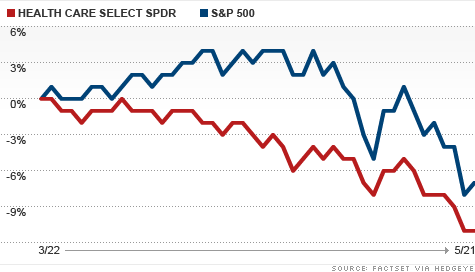Search News

FORTUNE -- With Rand Paul's victory last week in the Republican primary in Kentucky, the Tea Party has instantly earned, if not mainstream status, at least a seat at the table of national discussion. Paul galvanized that in his victory speech when he said, "I have a message, a message from the Tea Party, a message that is loud and clear and does not mince words: We have come to take our government back."
Paul's victory is part of the run against Washington / incumbency theme that is picking up speed across America. Not being an incumbent seems to bestow a real advantage in politics these days. In the past month, this theme has been underscored by Arlen Specter losing in Pennsylvania, Bob Bennet losing his party's nomination in Utah, Blanche Lincoln being forced into a runoff in Arkansas, and Charlie Crist being forced to run as an independent for the Senate in Florida.
Typically one grassroots incumbency challenge per election cycle is noteworthy, but when every race becomes a challenge against incumbents in both parties, it is a leading indicator of a sea change. According to a study from opensecrets.org, in election results going back to the early 1980s, incumbents win 90% or more of the time in the House and more than 85% of the time on the Senate.
The data from the early stages of the 2010 election cycle are noteworthy and could mark the beginning of a serious shift by voters away from supporting incumbents.
Recent polls also support the trend. Specifically, a recent ABC News-Washington Post poll indicated that nearly six in 10 respondents are not likely to vote for their current representatives to Congress. This doesn't bode well for Democrats in the upcoming midterms -- particularly as President Obama's approval rating is mired near the lowest of his presidency, with a 47.6% aggregate rating on the Real Clear Political Poll.
The Democrats are the de facto incumbent political party. With support for incumbents at generational lows, this could lead to a shift comparable to the one experienced under President Clinton in 1994. After that year's elections, the Senate shifted from 57 Democrats to 52 Republicans. In the House, the swing was 258 Democrats to 230 Republicans.
What this means for the health care business
In equities, the sector that will likely benefit most from Republicans regaining both houses is health care. As outlined in the chart above, health care has underperformed the broader market by almost a margin of 2:1 since the House passed the health care bill on March 21st. A shift in control of Congress back to the Republicans would likely lead to a rolling back of certain aspects of the bill, which would be positive for the industry and its ability to maintain pricing power (versus having pricing mandated by the government) and therefore protect profit margins.
According to our Healthcare Sector Head Tom Tobin, investors are already contemplating comparisons to the midterm elections of 1994. In 1994, as in 2010, healthcare has been at the center of the ascent and decline of a Democratic Administration and Congress. And as in 1994, healthcare valuations are near decade lows. From 1994 to 2000, the S&P 500 Healthcare Index rallied 400%.
Yet there's a key risk to a replay of this rally: if it's the Tea Party, and not mainstream Republicans that make inroads in the upcoming midterms, they claim to want to do more than just roll back health care reform and leave spending in place. The three tenets of the Tea Party are the "core values of Fiscal Responsibility, Constitutionally Limited Government and Free Markets."
Therefore, the more political power the Tea Party attains, the more likely it becomes that is that Tea Party candidates will push for massive budget cuts in Washington, which could lead to a dramatic reduction in government spending on health care. This would be negative for health care sector performance, as the government remains the industry's largest client.
So, if the Tea Party truly has cometh, and incumbents are yesterday's news, investors might want to think about which of these two paths their newly elected officials embark on: rolling back health care reform, or cutting back public health care spending altogether. Each has dramatically different consequences.
Daryl G. Jones is the Managing Director of Risk Management at Hedgeye, a research firm based in New Haven, Conn. His colleagues Thomas Tobin and Christian Drake also contributed to this column. ![]()






| Company | Price | Change | % Change |
|---|---|---|---|
| Ford Motor Co | 8.29 | 0.05 | 0.61% |
| Advanced Micro Devic... | 54.59 | 0.70 | 1.30% |
| Cisco Systems Inc | 47.49 | -2.44 | -4.89% |
| General Electric Co | 13.00 | -0.16 | -1.22% |
| Kraft Heinz Co | 27.84 | -2.20 | -7.32% |
| Index | Last | Change | % Change |
|---|---|---|---|
| Dow | 32,627.97 | -234.33 | -0.71% |
| Nasdaq | 13,215.24 | 99.07 | 0.76% |
| S&P 500 | 3,913.10 | -2.36 | -0.06% |
| Treasuries | 1.73 | 0.00 | 0.12% |
|
Bankrupt toy retailer tells bankruptcy court it is looking at possibly reviving the Toys 'R' Us and Babies 'R' Us brands. More |
Land O'Lakes CEO Beth Ford charts her career path, from her first job to becoming the first openly gay CEO at a Fortune 500 company in an interview with CNN's Boss Files. More |
Honda and General Motors are creating a new generation of fully autonomous vehicles. More |
In 1998, Ntsiki Biyela won a scholarship to study wine making. Now she's about to launch her own brand. More |
Whether you hedge inflation or look for a return that outpaces inflation, here's how to prepare. More |